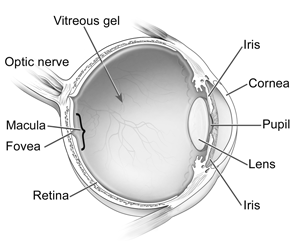Corneal Abrasion
What Is a Corneal Abrasion?
The cornea is the clear, round dome that covers the iris - the colored portion of your eye, and the pupil - the black circle in the center of the iris. Like the clear face of a watch protects its inner parts, the cornea also provides a protective layer around the eye. It also helps focus light through the eye’s lens onto the retina, and plays an important role in our vision.
Photo Credit: National Eye Institute, National Institutes of Health
Our corneas are comprised of five layers: Epithelium, Bowman's membrane, stroma, Descemet's membrane and the endothelium. A corneal abrasion occurs when there is an injury to the outermost layer, the epithelium. The injury can be a scratch, scrape, or cut, and may be caused by such things as a fingernail scratch, a paper cut, a makeup brush, a scrape from a branch of a tree or bush, and even rubbing your eye. If you have been diagnosed with chronic dry eye, you are at a greater than average risk of a corneal abrasion.
If you have a corneal abrasion, you will likely experience one or more of the following symptoms:
- Pain and soreness
- Feeling of something in your eye
- Redness
- Tearing
- Sensitivity to light
- Blurred vision
If you have scratched or injured your cornea, you should see your eye doctor as soon as possible. With proper treatment, corneal abrasions normally heal within 1-7 days, depending upon severity. In most cases, a corneal abrasion will heal without leaving a scar. However, if left untreated, the abrasion can become infected, resulting in a corneal ulcer, a far more serious eye problem.
How Is a Corneal Abrasion Detected?
Your doctor will use a slit lamp examination to detect a corneal abrasion. He will first apply fluorescein drops to your eye which will highlight the abrasion.
How Is a Corneal Abrasion Treated?
Your doctor will prescribe one or more of the following treatments, depending on the severity of your abrasion:
- Patching the eye to prevent blinking, which can further irritate the abrasion.
- Using lubricating eyedrops or ointment
- Using NSAID (non-steroidal anti-inflammatory drops) to decrease pain
- Using antibiotic eyedrops or ointment to prevent infection
- Wearing a special contact lens to promote healing
If you normally wear contact lenses, discontinue use until your doctor advises that it’s safe to wear them again. Also, you must avoid rubbing your eye while it is healing.
Prompt treatment of corneal abrasions is the key to protecting your vision. You should not delay in contacting your doctor if you have injured your eye or if you experience any of the symptoms of a corneal abrasion.
Primary Eye Care Specialists at Kadrmas Eye Care New England
Meet our optometrists who specialize in primary eye care and general eye health:

